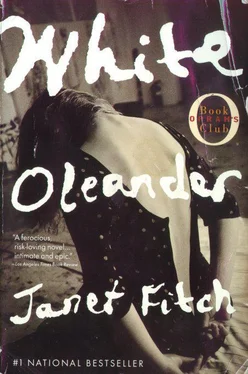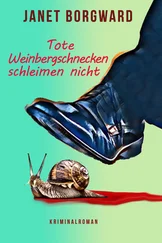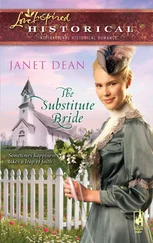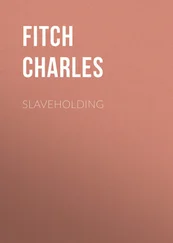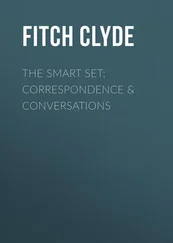Janet Fitch - White Oleander
Здесь есть возможность читать онлайн «Janet Fitch - White Oleander» весь текст электронной книги совершенно бесплатно (целиком полную версию без сокращений). В некоторых случаях можно слушать аудио, скачать через торрент в формате fb2 и присутствует краткое содержание. Жанр: Современная проза, на английском языке. Описание произведения, (предисловие) а так же отзывы посетителей доступны на портале библиотеки ЛибКат.
- Название:White Oleander
- Автор:
- Жанр:
- Год:неизвестен
- ISBN:нет данных
- Рейтинг книги:3 / 5. Голосов: 1
-
Избранное:Добавить в избранное
- Отзывы:
-
Ваша оценка:
- 60
- 1
- 2
- 3
- 4
- 5
White Oleander: краткое содержание, описание и аннотация
Предлагаем к чтению аннотацию, описание, краткое содержание или предисловие (зависит от того, что написал сам автор книги «White Oleander»). Если вы не нашли необходимую информацию о книге — напишите в комментариях, мы постараемся отыскать её.
White Oleander — читать онлайн бесплатно полную книгу (весь текст) целиком
Ниже представлен текст книги, разбитый по страницам. Система сохранения места последней прочитанной страницы, позволяет с удобством читать онлайн бесплатно книгу «White Oleander», без необходимости каждый раз заново искать на чём Вы остановились. Поставьте закладку, и сможете в любой момент перейти на страницу, на которой закончили чтение.
Интервал:
Закладка:
But she didn’t, only stopped and picked a sprig of alyssum to smell the honey. I cut a shred from my heart and dangled it on a homemade hook before her.
“I like your yard,” I called out.
She looked up, startled, as if she knew I was there but didn’t think I’d speak to her. Her eyes were large and almond-shaped, the color of root beer. She wore a thin scar on her left cheek, and a gold watch on her narrow wrist. She pushed a strand of marcel-waved hair from her face and threw me a quick smile, which faded just as quickly. She turned back to her lilies. “You better not be seen talking to me. She’s going to burn a cross on my lawn.”
“You don’t have a lawn,” I said.
She smiled, but she didn’t look at me again.
“My name’s Astrid,” I said.
“You go inside now,” she said. “Astrid.”
11
HER NAME WAS Olivia Johnstone. That was the name on the magazines and catalogs on her doormat. She took Conde Nast Traveler and French Vogue , thick as a phone book. I babysat the kids in the front yard now, not to miss the least glimpse of her leaving the house in her Jackie O sunglasses, returning from shopping, clipping her herbs. Hoping our eyes would meet again. Packages came for her almost daily, the handsome UPS man lingering in her doorway. I wondered if he was in love with her, his legs like tree trunks in his UPS brown shorts.
At night, from the kitchen window, I began to take note of her visitors. Always men. A black man whose white French cuffs lay bright against his dark skin, gold cuff links glimmering. He drove a black BMW, came around seven-thirty, and was always gone by midnight. A young man with Rasta hair and Birkenstocks came in a Porsche. Sometimes he was still there when I got up in the morning. A large balding white man who wore striped shirts and double-breasted suits with big lapels. He drove a monstrous Mercedes, and came every day for a week.
What I noticed especially was the way they hurried from their shining cars, their excitement. I wondered what she must do that put such urgency in their steps. I wondered which she liked best. I thought about what she must know about men, how she must shine for them like a lighthouse.
I refused to think for a second that Marvel might be right about anything, let alone Olivia Johnstone. I lived for the sight of her, taking out her trash or alighting from her car in the dim light of dawn while I was making my breakfast. It was just enough dew on my decks to keep me another day.
I picked sprigs of her rosemary and tucked them in my pockets. I went through her garbage when I knew she was out, thirsty to know more, to touch the things she touched. I found a wide-toothed tortoiseshell comb from Kent of London, good as new except for a single broken tooth, and a soap box, Crabtree and Evelyn’s Elderflower. She drank Myers’s rum, used extra virgin olive oil in a tall bottle. One of her boyfriends smoked cigars. I found an impossibly soft stocking, the garter kind, cloud taupe, laddered, and an empty flagon of Ma Griffe perfume, its label decorated with a scribble of black lines on white. It smelled of whispery black organdy dresses, of spotted green orchids and the Bois de Boulogne after rain, where my mother and I once walked for hours. I thrilled to share Paris with Olivia Johnstone. I saved the bottle in my drawer to scent my clothes.
THEN ONE DAY Olivia’s newspapers and magazines lay on her doorstep, untouched. The Corvette sat sullen under a tan canvas cover dotted with fallen jacaranda flowers like mementos of loss. Just the sight of the landlocked Corvette made me wish I had some Percodan left. I settled for some leftover codeine cough syrup Marvel had in her medicine chest. The sticky cloying taste lingered as I sat on my ripcord bedspread and combed my hair with Olivia’s comb. I was in awe of her perfection. A woman who would throw out a handmade tortoiseshell comb just because it was missing a tooth. I wondered if she really made love to men for money, what that was like. Prostitute. Whore. What did they really mean anyway? Only words. My mother would hate that, but it was true. Words trailing their streamers of judgment. A wife got money from her husband and nobody said anything. And if Olivia’s boyfriends gave her money? So what?
I combed my hair and made a French twist, imagining myself as Olivia. I stalked the small room, walking the way she walked, hips first, like a runway model. What difference did it make if she was a whore. It sounded like ventriloquism to even say it. I hated labels anyway. People didn’t fit in slots—prostitute, housewife, saint—like sorting the mail. We were so mutable, fluid with fear and desire, ideals and angles, changeable as water. I ran her stocking up my leg, smelled the Ma Griffe.
I imagined she’d gone to Paris, that she was sitting at a cafe, having a cloudy Pernod and water, scarf tied to her purse like the women in her French Vogue . I imagined she was with the BMW man, the quiet one with gold cuff links who liked jazz. I’d imagined them often, dancing in the old-fashioned way in her living room, hardly moving their feet, his cheek resting on the top of her close-waved hair. That’s how I saw her in Paris. Staying up late in a jazz club only black Parisians knew, in a cellar on the Rive Gauche, dancing. I could see the champagne and the way their eyes closed, and they weren’t thinking of anything but more of the same.
I sat in the sun’s blistering glare off the blacktop after school, doing my homework and listening to Justin and Caitlin splash in the inflatable pool, shrieking, squabbling over the toys. I was waiting, thinking ahead, setting out my hubcaps. At 4:25 the UPS man stopped in front of Olivia’s and began to write up a delivery slip.
I stepped up to the chain-link fence. “Excuse me,” I said. “Olivia said you could leave the package with me.” I smiled, trying to project a neighborly trustworthiness. I was the girl next door, after all. “She told me she was expecting it.”
He brought the clipboard and I signed. The shipment was a small box marked Williams-Sonoma. I wondered what it could be, but my curiosity about what was in the box paled when compared to my determination to make friends with Olivia Johnstone, to someday enter the shuttered house.
THE DAY SHE returned, I made up a story about a project I had to finish with a classmate in the neighborhood. I wasn’t a good liar. My mother always said I had no imagination. But I kept it short, and Marvel gave me an hour. “I need you home at five, I’ve got a party.” She sold Mary Kay, and though she didn’t make much money at it, it made her feel important.
I took the box out of my laundry bag, where I’d kept it hidden, and walked up Olivia’s steps, onto her porch. I rang the doorbell. Almost immediately, her shape appeared behind the bubble-glass diamonds of her door, just like ours except the inserts were yellow instead of turquoise. I could feel her looking at me through the spyhole. I tried to look calm. Just a neighbor doing a favor. The door opened. Olivia Johnstone was wearing a long print halter dress, her hair in a low chignon, her bare cinnamon shoulders smooth as bedposts.
I held the box out to her. “The UPS man left this.” One tooth on the comb, one tooth. She was perfect.
Olivia smiled and took the box. Her nails were short, white-tipped. She thanked me in an amused voice. I could tell she knew it was just a ploy, that I wanted to climb into her life. I tried to look past her but could only see a mirror and a small red-lacquered table.
Then she said the words I’d been dreaming of, hoping for. “Would you like to come in? I was just pouring some tea.”
Was there anything as elegant as Olivia’s house? In the living room, the walls were covered with a gold paper burnished to the quality of cork. She had a taupe velvet couch with a curved back and a leopard throw pillow, a tan leather armchair, and a carved daybed with a striped cotton cover. A wood table with smaller tables tucked underneath it held a dull green ceramic planter bearing a white spray of orchids like moths. Jazz music quickened the pace of the room, the kind the BMW man liked, complicated trumpet runs full of masculine yearning.
Читать дальшеИнтервал:
Закладка:
Похожие книги на «White Oleander»
Представляем Вашему вниманию похожие книги на «White Oleander» списком для выбора. Мы отобрали схожую по названию и смыслу литературу в надежде предоставить читателям больше вариантов отыскать новые, интересные, ещё непрочитанные произведения.
Обсуждение, отзывы о книге «White Oleander» и просто собственные мнения читателей. Оставьте ваши комментарии, напишите, что Вы думаете о произведении, его смысле или главных героях. Укажите что конкретно понравилось, а что нет, и почему Вы так считаете.
